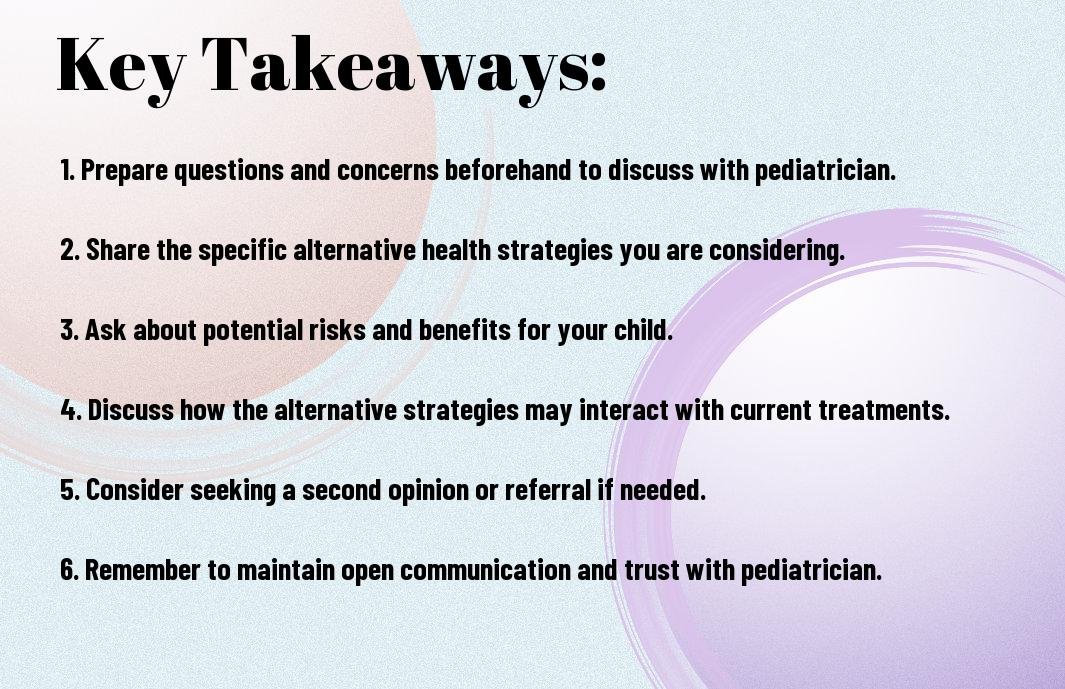Just as parents, it is vital to have a comprehensive template when discussing alternative health strategies with your child’s pediatrician. In this guide, we will cover key points to consider, questions to ask, and how to approach the conversation with compassion and respect. By following this template, you can navigate these discussions effectively and make informed decisions for your child’s well-being.
Table of Contents
Key Takeaways:
- Open communication: Encourage open and honest communication with your pediatrician about alternative health strategies you are considering for your child.
- Educate yourself: Do thorough research on any alternative health approaches before discussing them with your pediatrician to ensure you are well-informed.
- Respect your pediatrician’s expertise: Trust your pediatrician’s medical expertise and be open to discussing how alternative strategies can complement conventional medical treatments.
- Collaborate on a plan: Work together with your pediatrician to create a comprehensive health plan that incorporates both conventional and alternative approaches tailored to your child’s specific needs.
- Monitor and reassess: Regularly monitor the effectiveness of any alternative health strategies with your pediatrician and be open to adjusting the plan as needed for the best outcomes for your child.

Preparing for the Conversation
Identifying Your Concerns and Questions
For your discussion with your pediatrician about alternative health strategies, start by identifying your specific concerns and questions. Consider what issues you hope to address with alternative approaches and jot down any questions you may have about these strategies.
Gathering Information About Alternative Health Strategies
For gathering information about alternative health strategies, compile a list of the different approaches you are interested in exploring. This may include herbal remedies, acupuncture, chiropractic care, or dietary changes. Research each option thoroughly to understand the potential benefits and risks.
Health strategies such as herbal remedies or supplements can interact with medications or existing health conditions, so it’s crucial to discuss these with your pediatrician for comprehensive guidance. Share your findings and ask for recommendations based on your child’s individual health needs. Being well-prepared will help facilitate an informed and productive conversation with your pediatrician.

Building a Collaborative Relationship with Your Pediatrician
Establishing Open Communication
You can foster a trusting relationship with your pediatrician by establishing open communication. Share your beliefs, concerns, and goals openly and honestly. Encourage your pediatrician to do the same, creating a safe space for discussion and collaboration.
Finding Common Ground and Shared Goals
For effective collaboration, it’s necessary to find common ground and shared goals with your pediatrician. Discuss your child’s health holistically, considering both conventional and alternative approaches. Together, you can create a comprehensive plan that incorporates the best of both worlds for optimal health outcomes.
With shared goals and mutual respect, you can work together towards the well-being of your child. Listen attentively to your pediatrician’s expertise and be open to their recommendations, while also voicing your preferences and concerns.

Discussing Alternative Health Strategies
Introducing the Topic and Setting the Tone
Tone: Not all pediatricians may be familiar with alternative health strategies, so approach the topic with openness and respect.
Exploring Options Together
Together: Collaborate with your pediatrician to explore alternative health options that may complement conventional treatments.
Exploring: Discuss various alternative health approaches such as acupuncture, herbal remedies, or mindfulness techniques with your pediatrician. Share your child’s health goals and concerns to tailor a holistic plan together.
Evaluating the Evidence and Safety
For: Assess the scientific evidence and safety of alternative health strategies with your pediatrician to make informed decisions.
A: Always prioritize safety and evidence-based practices when considering alternative health strategies for your child. Your pediatrician can help you review studies, guidelines, and potential side effects to ensure the best outcomes for your child’s health.
Exploring Holistic Approaches
All 10 Questions To Ask Your Holistic Pediatrician During your pediatrician visit. When discussing alternative health strategies with your pediatrician, it’s important to explore holistic approaches that consider the whole child and focus on natural ways to promote wellness.
Nutrition and Dietary Changes
Dietary changes can play a significant role in improving your child’s overall health. Choosing whole, unprocessed foods and limiting sugar intake can have a positive impact on energy levels, mental clarity, and immune function.
Mind-Body Therapies and Stress Reduction
Approaches such as yoga, meditation, and breathing exercises can help children manage stress and anxiety more effectively. Teaching your child these practices early on can provide them with valuable tools for coping with life’s challenges.
Understanding the importance of balancing physical and emotional well-being is key to promoting overall health in children. Incorporating holistic approaches like nutrition, mind-body therapies, and herbal remedies can create a well-rounded approach to pediatric care.
Herbal Remedies and Supplements
For centuries, herbal remedies and supplements have been used to support children’s health and well-being. When considering these options, it’s crucial to consult with a qualified healthcare provider to ensure safety and efficacy.
Understanding the role of herbal remedies and supplements in pediatric care can provide parents with additional tools to support their child’s health. It’s important to approach these alternatives with caution and seek guidance from a knowledgeable healthcare professional.
Addressing Skepticism and Concerns
Anticipating and Addressing Objections
For anticipating and addressing objections from your pediatrician about alternative health strategies, it’s necessary to come prepared with research and reputable sources. Addressing concerns calmly and confidently can help ease skepticism and open up a constructive dialogue.
Managing Expectations and Misconceptions
Objections around alternative health strategies often stem from misconceptions and unrealistic expectations. It’s crucial to educate your pediatrician on the benefits and limitations of these approaches. Setting realistic expectations and providing reliable information can help alleviate concerns and foster a more collaborative relationship.
Expectations are key when discussing alternative health strategies with your pediatrician. Highlight the importance of open communication and shared decision-making to ensure both parties are on the same page.
Creating a Personalized Plan
After referencing The Use of Complementary and Alternative Medicine in Pediatrics, it’s vital to work with your pediatrician to create a personalized plan that integrates alternative health strategies into your child’s care effectively.
Integrating Alternative Strategies into Conventional Care
Conventional treatments can be complemented by alternative health strategies to enhance your child’s well-being. Discuss with your pediatrician the incorporation of acupuncture, herbal remedies, or mind-body practices alongside traditional medicine for a comprehensive approach to care.
Monitoring Progress and Adjusting the Plan
The key to a successful health plan is regularly monitoring progress and making adjustments as needed. Tracking changes in symptoms, energy levels, and overall mood can help gauge the effectiveness of the plan. Communicate openly with your pediatrician to fine-tune the approach and ensure optimal outcomes for your child’s health.
It is crucial to remember that every child is unique, and what works for one may not work for another. Open communication, flexibility, and patience are vital when devising and modifying a personalized health plan. By collaborating with your pediatrician and staying attentive to your child’s needs, you can create a holistic approach to healthcare that supports their well-being in the best possible way.
Final Words
As a reminder, when discussing alternative health strategies with your pediatrician, remember to approach the conversation with an open mind and a willingness to collaborate. By sharing your thoughts and concerns respectfully, you can work together to find the best solutions for your child’s health and well-being. Trust in the expertise of your healthcare provider while also advocating for what you believe is best for your child. Keeping an open dialogue and fostering a partnership with your pediatrician can lead to better outcomes for your little one’s health.
FAQ
Q: Why is it important to discuss alternative health strategies with my pediatrician?
A: It is important to discuss alternative health strategies with your pediatrician to ensure the safety and efficacy of any treatments or interventions for your child’s health. Your pediatrician can provide valuable insights and guidance based on their medical expertise.
Q: What are some examples of alternative health strategies for children?
A: Examples of alternative health strategies for children may include herbal remedies, acupuncture, chiropractic care, nutritional supplements, and mind-body practices such as yoga or meditation.
Q: How do I initiate a conversation about alternative health strategies with my pediatrician?
A: To initiate a conversation about alternative health strategies with your pediatrician, schedule a dedicated appointment to discuss your concerns and goals. Be open and honest about your interest in exploring alternative approaches to your child’s health.
Q: What should I consider when discussing alternative health strategies with my pediatrician?
A: When discussing alternative health strategies with your pediatrician, consider your child’s specific health needs, any existing medical conditions, potential interactions with conventional treatments, and the qualifications of practitioners offering alternative therapies.
Q: How can I ensure a collaborative and respectful dialogue with my pediatrician about alternative health strategies?
A: To ensure a collaborative and respectful dialogue with your pediatrician about alternative health strategies, approach the conversation with an open mind, listen to your pediatrician’s perspective, ask questions, and work together to create a comprehensive and integrated healthcare plan for your child.
Recent Posts
Revitalize your health with an innovative detox approach offered by Root Wellness. This powerful solution enhances wellness through natural ingredients like zeolite and silica, effectively cleansing...
Roots Clean Slate Erfahrungen Revitalize With Bioavailable Silicon
Revitalizing your health begins with a natural approach to removing harmful substances. Detoxification can pave the way for a more vibrant life through effective cleansing methods. Bioavailable...


